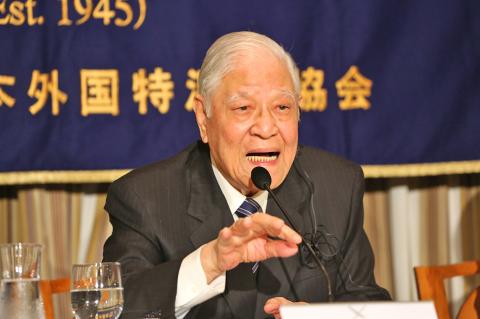Former president Lee Teng-hui (李登輝) held one-and-a-half-hour talks with with Japanese Prime Minister Shinzo Abe yesterday at a hotel near the National Diet Building, TV Tokyo Corp reported.
TV Tokyo Corp yesterday said that Abe visited Lee at the Capital Hotel Tokyu where Lee stayed, which if true, would be an unprecedented event.
The television station cited sources within the Liberal Democratic Party “with close ties to Taiwan,” and said Lee confirmed he had met Abe before he left the hotel to give a talk at the Foreign Correspondents’ Club of Japan (FCCJ) yesterday.

Photo: CNA
However, Lee Teng-hui Foundation Secretary-General Wang Yan-chun (王燕軍) later denied that Lee had met with Abe.
Wang said Abe was at the hotel to meet with someone other than Lee, Wang said, adding that further questions for details should be directed to Abe.
Responding to reporters’ questions at the FCCJ meeting, Lee said only: “I cannot say anything on having met [with Abe]. I can only say that Prime Minister Abe has contributed greatly to Japan.”
Separately, reporters from the Liberty Times (the Taipei Times’ sister newspaper), asked Lee what his thoughts were on reports that China simulated an attack on the Presidential Office Building in war games despite President Ma Ying-jeou (馬英九) administration’s China-leaning policies, and how Taiwan should pursue future relations with China.
Lee said that Taiwanese politics may see changes after the combined presidential and legislative elections on Jan. 16 next year, but that the basic line with China should be: “China is China, Taiwan is Taiwan.”
Lee added that as long as both sides could respect each other, there could be peaceful coexistence.
“We absolutely will not agree if China is pushing the ‘one China’ principle,” Lee said.
Lee strongly praised the Abe administration’s national defense bill, which would lift restrictions on Japanese troops to allow them to fight abroad for the first time since World War II, saying that the bill would contribute to peace and stability in not only Japan, but also globally.
When asked by Hong Kong reporters on his evident affection for Japan and if Taiwanese felt life was better under Japanese rule, Lee said that Japanese did not treat Taiwanese any better under its rule, but people like Japanese colonial administrator Goto Shinpei and Japanese civil engineer Yoichi Hatta had benefited Taiwan greatly.
Japan also enabled Taiwan’s rapid modernization, Lee said, adding that Taiwanese aid to Japan after the earthquake, tsunami and nuclear power plant meltdown in 2011 is symbolic of Taiwan-Japan friendship.

Authorities have detained three former Taiwan Semiconductor Manufacturing Co (TMSC, 台積電) employees on suspicion of compromising classified technology used in making 2-nanometer chips, the Taiwan High Prosecutors’ Office said yesterday. Prosecutors are holding a former TSMC engineer surnamed Chen (陳) and two recently sacked TSMC engineers, including one person surnamed Wu (吳) in detention with restricted communication, following an investigation launched on July 25, a statement said. The announcement came a day after Nikkei Asia reported on the technology theft in an exclusive story, saying TSMC had fired two workers for contravening data rules on advanced chipmaking technology. Two-nanometer wafers are the most

DEFENSE: The first set of three NASAMS that were previously purchased is expected to be delivered by the end of this year and deployed near the capital, sources said Taiwan plans to procure 28 more sets of M-142 High Mobility Artillery Rocket Systems (HIMARS), as well as nine additional sets of National Advanced Surface-to-Air Missile Systems (NASAMS), military sources said yesterday. Taiwan had previously purchased 29 HIMARS launchers from the US and received the first 11 last year. Once the planned purchases are completed and delivered, Taiwan would have 57 sets of HIMARS. The army has also increased the number of MGM-140 Army Tactical Missile Systems (ATACMS) purchased from 64 to 84, the sources added. Each HIMARS launch pod can carry six Guided Multiple Launch Rocket Systems, capable of

CHINA’s BULLYING: The former British prime minister said that he believes ‘Taiwan can and will’ protect its freedom and democracy, as its people are lovers of liberty Former British prime minister Boris Johnson yesterday said Western nations should have the courage to stand with and deepen their economic partnerships with Taiwan in the face of China’s intensified pressure. He made the remarks at the ninth Ketagalan Forum: 2025 Indo-Pacific Security Dialogue hosted by the Ministry of Foreign Affairs and the Prospect Foundation in Taipei. Johnson, who is visiting Taiwan for the first time, said he had seen Taiwan’s coastline on a screen on his indoor bicycle, but wanted to learn more about the nation, including its artificial intelligence (AI) development, the key technology of the 21st century. Calling himself an

South Korea yesterday said that it was removing loudspeakers used to blare K-pop and news reports to North Korea, as the new administration in Seoul tries to ease tensions with its bellicose neighbor. The nations, still technically at war, had already halted propaganda broadcasts along the demilitarized zone, Seoul’s military said in June after the election of South Korean President Lee Jae-myung. It said in June that Pyongyang stopped transmitting bizarre, unsettling noises along the border that had become a major nuisance for South Korean residents, a day after South Korea’s loudspeakers fell silent. “Starting today, the military has begun removing the loudspeakers,”